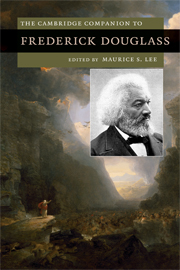Book contents
- Frontmatter
- Introduction
- 1 Douglass’s Self-Making and the Culture of Abolitionism
- 2 Identity in the Autobiographies
- 3 Douglass as Orator and Editor
- 4 Crisis and Faith in Douglass’s Work
- 5 Violence, Manhood, and War in Douglass
- 6 Human Law and Higher Law
- 7 Sentimental Douglass
- 8 Douglass among the Romantics
- 9 Douglass’s Black Atlantic: Britain, Europe, Egypt
- 10 Douglass’s Black Atlantic: The Caribbean
- 11 Douglass, Ideological Slavery, and Postbellum Racial Politics
- 12 Born into Slavery: Echoes and Legacies
- Guide to Further Reading
- Index
11 - Douglass, Ideological Slavery, and Postbellum Racial Politics
Published online by Cambridge University Press: 28 July 2009
- Frontmatter
- Introduction
- 1 Douglass’s Self-Making and the Culture of Abolitionism
- 2 Identity in the Autobiographies
- 3 Douglass as Orator and Editor
- 4 Crisis and Faith in Douglass’s Work
- 5 Violence, Manhood, and War in Douglass
- 6 Human Law and Higher Law
- 7 Sentimental Douglass
- 8 Douglass among the Romantics
- 9 Douglass’s Black Atlantic: Britain, Europe, Egypt
- 10 Douglass’s Black Atlantic: The Caribbean
- 11 Douglass, Ideological Slavery, and Postbellum Racial Politics
- 12 Born into Slavery: Echoes and Legacies
- Guide to Further Reading
- Index
Summary
In his 1871 essay, “The New Party Movement,” Frederick Douglass laments that blacks in the South must fear “not the written law, which cannot execute itself, but the unwritten law of a powerful [Democratic] party, perpetually executing itself in the daily practices of that party ” (LW 4:256). They must fear not corporal slavery but what I call ideological slavery. In the public sphere, this latter form of slavery uses ideas and discourse to “render” blacks only a “little better than slaves to a community, by being proscribed, limited, oppressed, and doomed to poverty and ignorance as effectually as though laws were passed ordaining their degradation.” A writer, critic, editor, orator, and political activist, Douglass was well authorized to communicate his frustration with the real-world, practical effects of “the unwritten law.” That emotion corresponds to his mixed opinion, also expressed in the essay, on the political status and outlook of blacks in America. He believes that, since their constitutional emancipation from slavery in 1865, blacks have enjoyed unprecedented success in law and politics. Yet, during this same period, they have also grappled with the rollbacks of their civil rights and the rise of the Democratic Party, two circumstances that have together stripped them of legal and political power. Thus, Douglass suggests that the unwritten laws of racial injustice and chauvinism may be as socially immediate and palpable as the laws written in the US Constitution or elsewhere by Congress.
- Type
- Chapter
- Information
- The Cambridge Companion to Frederick Douglass , pp. 160 - 172Publisher: Cambridge University PressPrint publication year: 2009

